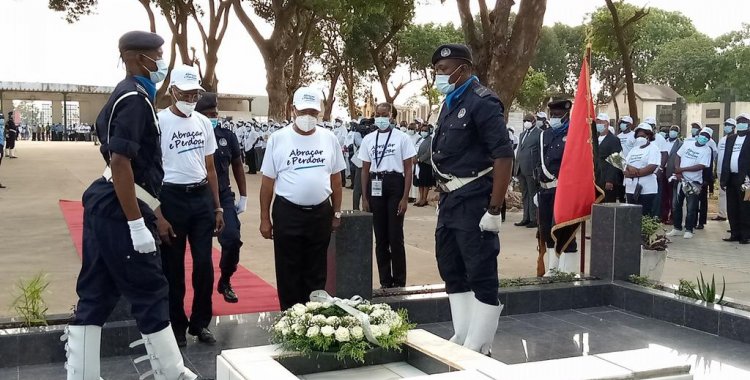The decision was taken this Thursday after a meeting of the Coordination of the Commission for the Implementation of the Plan of Reconciliation in Memories of Victims of Political Conflicts (Civicop), which will integrate direct contact with families and the collection of genetic information from a database of surviving relatives in Angola and abroad in its 2022 action plan.
So far, Civicop has communicated information about the process of identifying human bones from conflict victims and their forensic analysis with samples taken from surviving family members through the press.
"The complexity of the work requires a more private act of clarification, with the families, on the processes of screening information from DNA exams, a process that requires more time to obtain complete and non-partial profiles", they concluded committee members, cited in a statement from Civicop.
Last November, the bones of former UNITA leaders, Salupeto Pena and Alicerces Mango, were handed over to the families, and another 10 bones were found that are undergoing a genetic study to compare them with information from the DNA samples of potential surviving relatives of victims of conflict.
Meanwhile, Civicop will deploy some services to follow up the request of Angolans living in Portugal, whose relatives have been victims of conflict, and who are available to collect their genetic data to relate them to potential relatives killed in conflicts in the country.
"We concluded that, cooperating with Portuguese authorities and Angolan associations abroad that mobilize families, the task is possible to be carried out. We are going to work in this direction", considered the members of Civicop.
The meeting brought together the ministers of Justice and Human Rights, Francisco Queiroz, Health, Sílvia Lutucuta, Interior, Eugénio Laborinho, and Telecommunications, Information Technologies and Social Communication, Manuel Homem, as well as sector technicians.
Among the points discussed were the evolution of DNA tests on the bones of UNITA leaders who perished in 1992 (by the forensic group), evolution of the collection of bones from other victims of political conflicts and their delivery to families (by the group of location and exhumation), evaluation of the possibility of collecting genetic material outside the country from family members living abroad, evaluation of the implementation of the institutional communication program and approval of the budget for the second phase.
During the first phase, Civicop registered more than 2000 requests for death certificates, after the first May 27 certificates were delivered, during the ceremony in which the victims of May 27 were honored.
The government held in 2021, for the first time in 44 years, a ceremony to mark the 27th of May, an alleged attempted coup d'état, which brought together survivors and orphans.
On May 27, 1977, an alleged coup attempt, in an operation apparently led by Nito Alves – then former interior minister since independence (11 November 1975) until October 1976 – was violently repressed by the regime of Agostinho Neto.
Six days earlier, on 21 May, the Popular Movement for the Liberation of Angola (MPLA, in power) had expelled Nito Alves from the party, prompting the former minister and several supporters to invade Luanda prison to free other supporters, assuming, in parallel, the control of the national radio station, becoming known as "fractionists".
The troops loyal to Agostinho Neto, with the support of the Cuban military, ended up containing the uprising and establishing order, and arresting the insurgents, followed by what became known as the "purge", with the elimination of factions, having some 30,000 people have been killed, mostly without any connection to Nito Alves, as Amnesty International has stated in several reports on the matter.
In April 2019, the President, João Lourenço, ordered the creation of a commission (Civicop) to draw up a general plan to pay tribute to the victims of the political conflicts that took place in Angola between November 11, 1975 (independence day) and April 2002 (end of civil war).
The Reconciliation Plan in Memory of Victims of Political Conflicts foresees, among other issues, the issuance of a death certificate and the construction of a single memorial for all victims of political conflicts registered in the country.
In the decree, João Lourenço includes among the conflicts "the coup attempt of the 27th of May or possible crimes committed by political movements or parties within the framework of the armed conflict".







